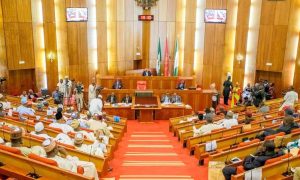On January 10th, 2024, the Central Bank of Nigeria (CBN) dissolved the boards and management of Union Bank, Keystone Bank, and Polaris Bank, citing non-compliance with regulatory requirements. This event sent shockwaves through the Nigerian financial sector.
However, the tremors intensified on June 3, 2024, when the apex bank took decisive action by revoking the operating license of Heritage Bank Plc. This decision stemmed from the bank’s persistent financial underperformance, characterised by metrics such as declining capital adequacy ratios, negative profitability, and a deteriorating loan portfolio. These factors placed Heritage Bank in a position of insolvency, posing a significant threat to the solvency and liquidity of the entire Nigerian financial system. This unprecedented series of interventions raises critical questions about the health of the Nigerian banking system and the effectiveness of the existing regulatory framework.
We have taken to this article to discuss the role of the Central Bank of Nigeria in ensuring financial stability, the ripple effect of the failure of Heritage Bank, and the lessons that are there to pick from the failure of Heritage Bank and the management of 3 other banks. We have also raised a few questions concerning the role of auditors in the sustainability of the Nigerian banking system.
Role of CBN in Ensuring Financial Stability
The CBN is tasked with safeguarding financial stability through a multi-pronged approach. This includes:
Maintaining Capital Adequacy: The CBN sets minimum capital adequacy ratios (CARs) for banks. These ratios measure a bank’s ability to absorb losses without becoming insolvent.
Promoting Sound Risk Management Practices: The CBN issues guidelines and regulations for risk management frameworks that banks must implement. This includes practices like stress testing, scenario planning, and loan classification.
Ensuring Regulatory Compliance: The CBN oversees banks’ adherence to all relevant regulations, including Know Your Customer (KYC) and Anti-Money Laundering (AML) provisions.
Promoting Public Confidence: The CBN takes actions to maintain public trust in the banking system, including deposit insurance schemes and prompt corrective action measures.
By shaking the management of 3 of the large banks in Nigeria and revoking Heritage Bank’s license, the CBN aimed to address these objectives and prevent a potential financial crisis.
Economic Impact and Ripple Effect
The revocation of a bank’s license has a domino effect on the broader economy. Here’s a more detailed breakdown of the economic impacts:
Depositors and Customers: Depositors faced uncertainty and potential losses depending on the coverage provided by the Nigerian Deposit Insurance Corporation (NDIC). NDIC will reimburse eligible depositors up to the maximum insured amount of N5 million in Deposit Money Banks (DMBs). Customers experienced disruptions in their financial transactions, impacting their ability to access funds, make payments, and utilize other banking services.
Market Sentiment: The sudden closure of Heritage Bank triggered a loss of confidence among investors. This could lead to capital flight, a decrease in foreign investment, and stock market volatility.
Credit Flow: Businesses and individuals who relied on Heritage Bank for loans faced challenges accessing credit. This can stifle economic growth as businesses may postpone expansion plans or investments.
Systemic Risk: Uncontrolled financial institution failures can lead to a cascading effect, impacting other banks through interbank lending relationships. The CBN’s intervention aimed to mitigate this contagion effect and prevent a broader financial crisis.
Lessons Learned: Risk Management and Governance
The Heritage Bank case offers valuable lessons for the Nigerian banking industry:
Proactive Risk Management: Banks must go beyond basic risk assessment and implement comprehensive risk management strategies. Early identification of financial deterioration, coupled with timely intervention and corrective actions, is crucial.
Effective Governance and Oversight: Strong corporate governance is essential. Boards of directors need to exercise effective oversight of management and ensure adherence to sound financial practices. Regulatory authorities also play a crucial role in holding banks accountable.
Enhanced Supervisory Vigilance: Regulatory bodies like the CBN require robust supervisory frameworks. Regular stress testing, on-site inspections, and prompt enforcement actions for non-compliance are crucial for early detection and intervention in case of financial weaknesses.
The Role of Auditors: Did Auditors Fail the Nigerian Banking System?
The recent tremors in the Nigerian banking sector, with the closure of Heritage Bank and the subsequent dissolution of leadership at Union Bank, Keystone Bank, and Polaris Bank, have cast a long shadow over the industry. Public confidence is shaken, and questions are swirling.
While regulators are being blamed, auditors, who are important for financial protection, are also facing increased scrutiny. The news suggests Heritage Bank’s auditors raised concerns about its viability, but questions linger.
Were these warnings clear enough? Did communication breakdowns occur? Did regulatory limitations prevent intervention? These cases highlight potential issues in Nigerian audit practices. Are audits deep enough to uncover hidden risks? Does auditor-bank familiarity lead to complacency?
Regulators must strengthen oversight, consider mandatory auditor rotation, and push for more transparent, detailed audit reports. Only through a multi-pronged approach, including reformed audit practices, can Nigeria rebuild public trust in its banking system.
The Power of Being Understood: The Stransact Advantage
Our affiliation with RSM, a global leader in audit and consulting, grants us access to industry-specific knowledge and cutting-edge risk management strategies. This translates to audits that are insightful and actionable, helping you identify and address potential issues early on.
Partner with Stransact and experience the power of being understood. Our meticulous audits, informed by the RSM Global Audit Methodology, have played a crucial role in safeguarding the financial health of numerous institutions, helping them walk through challenging times and avoid potential collapse. We empower you to build trust with stakeholders through clear, insightful reports that illuminate a path toward a more stable and prosperous future.
Conclusion
The revocation of Heritage Bank’s license and the shake in the management of 3 other banks in the country serves as a stark reminder of the importance of financial stability and proper governance. Banks must prioritize responsible lending practices, sound risk management, and robust corporate governance. It is advisable to engage the services of firms with credible risk management services to provide expertise. The CBN’s actions, while disruptive in the short term, were necessary to safeguard the integrity of the financial system and protect depositors, shareholders, and the broader Nigerian economy.



























